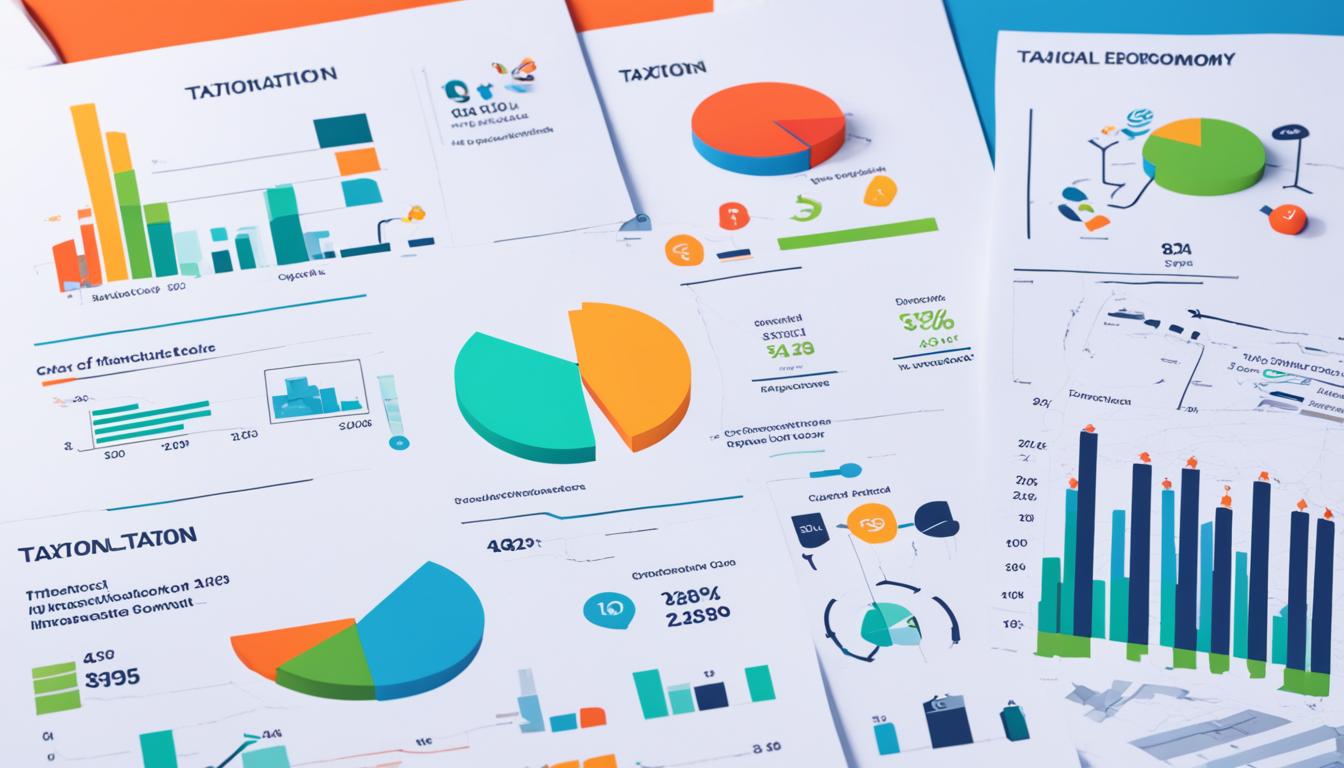Hyderabad , India
As India moves forward in technology, we wonder: Can our economy grow without digital taxation? Digital taxation in India marks a big change in how our government handles taxes. It’s not just about following rules but also about making taxes more efficient and getting more people involved.
By using technology, we want to strengthen our economy and follow global trends. These trends show how important digital systems are in managing taxes.
The government is working hard to make our economy better through better tax rules. They’re looking at changing tax rates and raising the limit for tax-free equity gains. This change will make taxes clearer, more efficient, and open to everyone. It will greatly help our economy stay stable.
Key Takeaways
- The move to digital taxation aims to make tax compliance easier and more efficient.
- Changes in tax rates will affect capital gains on both listed and unlisted assets.
- Using technology is key to making taxes more transparent and cutting down on tax evasion.
- Raising the limit for tax-free capital gains is a step towards boosting investor confidence.
- Investing in infrastructure is linked to digital taxation strategies to drive economic growth.
Introduction to Digital Taxation
Digital Taxation in India marks a big change in how we handle taxes. It uses new tools and methods to make sure people follow the tax rules better. This includes things like filing taxes online and paying through digital means.
By using technology, we make tax work easier and cut down on paperwork. This new way of doing things makes taxes simpler and more open. It’s needed because managing taxes in our digital world is getting harder.
The government plans to spend Rs. 2 lakh crore over five years to create jobs. This shows how important a strong digital tax system is. It helps the economy grow by investing in things like infrastructure, which boosts innovation and new businesses.
The latest budget changes show the government’s effort to make taxes better. They’ve stopped the angel tax to help startups grow. This is key for letting technology progress and change Digital Taxation in India.
As we move into this digital age, we’re focusing on making taxes easier for foreign companies and making financial rules clearer. We aim for a tax system that’s open and fair, using digital tools to its fullest.
| Key Focus Areas | Details |
|---|---|
| Infrastructure Development | Capital expenditure of Rs. 11.11 lakh crore to drive sustainable growth |
| Job Creation | 30 lakh individuals benefiting from a Rs. 2 lakh crore allocation over five years |
| Abolition of Angel Tax | Encourages investments in startups and innovation |
| Focus on Financial Sector Efficiency | Measures to enhance transparency and efficiency in taxation frameworks |
The Importance of Digital Taxation in Economic Growth
Digital taxation in India is key to boosting economic growth. It makes the tax system more efficient, reducing tax evasion. This leads to more government income and lower costs for businesses.
The government is investing in skills and infrastructure to support digital taxation. For instance, the Union Budget 2024-25 plans to spend Rs. 2 lakh crore over five years. This will help create jobs for 30 lakh people, pushing our economy forward.
Initiatives like loans for higher education and e-vouchers are boosting financial literacy among the young. Currently, only 4.4% of youths aged 15-29 have had formal financial training. This shows how crucial financial education is for them to understand digital taxation in India.
Improving how taxes are collected opens up chances for better public services and infrastructure. Recent GST changes are expected to cut production costs for liquid products. This shows how digital taxation can make different sectors run smoother, supporting our financial landscape.
The link between digital taxation and economic growth is strong. It encourages innovation and progress, helping everyone. By making things more transparent and efficient, we’re building a stronger economic future.
For more on how financial education links to digital taxation, check out here.
Impact of Digital Taxation on Tax Compliance
Digital taxation has changed how India handles taxes. Technology, especially Tax Compliance Software, helps make taxpayers more compliant. These tools make taxes clearer and more trustworthy.
Enhancing Transparency in Taxation
Advanced Tax Compliance Software makes taxes more transparent. It gives taxpayers real-time data and automated processes. This makes it easier for them to understand their tax duties.
It builds trust between taxpayers and the government. This leads to better compliance and accurate tax reports. Taxpayers find it simpler to follow their tax rules, improving tax collection.
Reducing Tax Evasion Risks
Digital taxation helps authorities keep a closer eye on taxes. They can spot any issues more easily. This reduces the risk of tax evasion.
Quick detection of problems makes taxpayers more accountable. It fights tax evasion and encourages more people to follow the rules. Taxpayers see they’re less likely to get away with wrongdoings.
Digital Taxation in India: Current Landscape
The digital tax scene in India is evolving fast, making tax processes simpler. Tools like the Income Tax e-Filing and GST Online Payments have made filing taxes easier. These systems help keep our economy in line with global standards by using technology.
However, there are hurdles in making digital taxation work well in India. Many people struggle with technology, making some find filing taxes hard. We need to understand these issues to make taxation fair for everyone.
The government has set aside Rs 1.48 lakh crore to train young people. This move supports digital taxation goals. Teaching people about finance will help them understand taxes better. Improving our digital skills is key to making the most of our tax systems.
Working towards a clear and easy-to-use digital tax system can boost our economy. Using new tech will make following tax rules easier, helping us collect taxes more efficiently across different areas.
Key Features of Digital Taxation Systems
Digital taxation is changing how we handle our money. Key features like Income Tax e-Filing, GST Online Payments, and Tax Compliance Software lead this change. They make things easier, more accurate, and help everyone stick to the rules.
Income Tax e-Filing Revolution
Income Tax e-Filing has made filing taxes online the norm. It cuts down on paperwork, making it quicker to send in returns. Now, people can file from home, making it easier to manage their taxes.
GST Online Payments and Compliance
GST Online Payments are key in digital tax. They make paying taxes simpler. Businesses can keep track of their taxes in real time, avoiding mistakes. This makes things clearer and lets companies focus more on their work.
Integration of Tax Compliance Software
Advanced Tax Compliance Software is crucial for today’s taxes. It automates tax work and checks for rules. This helps businesses avoid problems and keep their financial reports correct and current.
| Feature | Description | Benefits |
|---|---|---|
| Income Tax e-Filing | Online filing system for income tax returns | Faster processing, reduced paperwork |
| GST Online Payments | Simplified tax payment and collection mechanism | Enhanced compliance, real-time tracking |
| Tax Compliance Software | Automated tools for tax calculations and compliance | Minimised risks, accurate financial reporting |
Benefits of E-Invoicing for Businesses
E-Invoicing changes how businesses manage their invoices. It makes invoicing more efficient and less prone to errors. Traditional invoicing often leads to delays and mistakes, which e-invoicing solves.
Streamlining Invoice Management
E-Invoicing cuts down on administrative tasks for businesses. Automated systems make creating, sending, and approving invoices quick. This speeds up cash flow and lowers the chance of late payments.
By using e-invoicing, we make transactions smoother and boost our financial health.
Facilitating Real-time Tax Reporting
E-Invoicing is key for real-time tax reporting. It ensures accurate invoicing data and updates tax submissions quickly. This helps us meet tax rules and avoid fines.
Real-time updates give us insights into our taxes. This helps with planning and budgeting better.
Investing in e-invoicing and digital solutions helps our businesses grow. For example, combining e-invoicing with AI can make our financial practices even better. This mix of technologies is a strong reason to modernise our financial systems.
| Benefits | Impact |
|---|---|
| Streamlined Invoice Processes | Increased efficiency and reduced errors |
| Improved Cash Flow | Faster payment cycles |
| Enhanced Compliance | Timely tax reporting and reduced penalties |
| Data Accuracy | Less reliance on manual entry |
| Cost Savings | Reduced administrative overheads |
E-Invoicing is changing business operations in India. It’s pushing firms to adopt this digital approach for growth.
Tax Deducted at Source (TDS) in the Digital Age
Tax Deducted at Source (TDS) has changed a lot in the digital era. Now, thanks to new tech, TDS is more efficient and accurate. Employers and businesses can easily deduct taxes from payments to employees and vendors. This makes sure they follow the rules right away.
Using TDS technology has made things clearer and cut down on mistakes. This is key for a strong tax system. The tech behind TDS helps send payments on time, which lowers the risk of fines for late payments.
The move to digital has made following the rules easier for businesses. They now have better ways to handle their deductions and submissions. This change makes it simpler for taxpayers to follow the law and less complicated for tax work.
Adapting to these changes with TDS technology keeps us on top of our financial duties. As we move forward in this digital world, keeping things clear and following the rules is more important than ever. Thanks to technology, the future of Tax Deducted at Source looks good for businesses and the economy.
| Aspect | Traditional TDS Process | Digital TDS Process |
|---|---|---|
| Accuracy | Prone to manual errors | Automated and precise calculations |
| Timeliness | Risk of delays in payments | Instant deductions and remittances |
| Compliance | Complex reporting requirements | Simplified with digital tools |
| Transparency | Limited visibility on deductions | Real-time tracking and reporting |
Moving to a digital system helps with following the rules and builds trust in the tax system. This is key for economic growth. By using TDS technology, we make tax management better. This can greatly reduce the work for both taxpayers and tax authorities.
Role of Automated Tax Calculations
Automated Tax Calculations are changing the way people and businesses handle taxes in India. They make tax processes more efficient and ensure we follow the rules better. With advanced software, taxes are worked out instantly, taking into account different exemptions and deductions.
This technology makes understanding taxes easier and helps with planning our finances. It’s not just about doing the math. Automated solutions bring big benefits, like making tax work more efficient.
They cut down the chance of mistakes, so we can be sure our taxes are done right. This is key in a world where following tax laws is very important.
Automated Tax Calculations are a big help with the new tax rules. These rules have different tax levels, from nothing for incomes up to Rs. 3 lakh, to 30% for earnings over Rs. 15 lakh. These systems help us understand our taxes better, showing how we can save money and pay less tax.
Using these automated tools helps us make better financial choices. It makes our tax dealings more accurate and clear. So, by using Automated Tax Calculations, we improve our tax experience and follow the law better.
Digital Tax Audit and its Significance
The way we handle tax compliance is changing fast, thanks to new technology. Digital Tax Audits are key in this change. They make tax checks more thorough and precise. This helps everyone understand their tax duties better.
Keeping a strong system that makes taxpayers accountable is crucial. Digital Tax Audits help build trust in the tax system. They make sure people report their taxes correctly and on time. This makes things simpler for both taxpayers and tax authorities.
Good Digital Tax Audits help collect more taxes, which is important for national projects. With more money going to initiatives like the Vibrant Villages Programme (VVP), accurate tax collection is essential. As we use more technology, tax audits can help society in many ways.
Let’s look at the main points of Digital Tax Audits and why they matter:
| Aspect | Details |
|---|---|
| Transparency | Increased clarity for taxpayers on their obligations. |
| Accountability | Encourages responsible reporting among taxpayers. |
| Revenue Collection | Enhances accuracy in revenue collection methods. |
| Compliance | Simplifies compliance processes for taxpayers. |
| Technology Utilisation | Leverages modern technology in auditing practices. |
We’re adapting to these changes at Am Accountable. We offer expert virtual accounting services for startups in India. Contact us for help with Digital Tax Audit and tax compliance.
For more information, call us at 91 91778 42756 or email info@amaccountable.com.
E-Way Bill Integrations: Enhancing Logistics Efficiency
E-Way Bill Integrations are key to making logistics more efficient in India. They help move goods faster across state lines, cutting down on paperwork time. This makes managing logistics easier, keeping supply chains running smoothly.
Impacts on Supply Chain Management
Having efficient logistics affects supply chain management a lot. With E-Way Bill Integrations, there are fewer delays in transport. This means goods get to customers faster. Better tracking helps manage stock better and makes customers happier with quick deliveries.
Using digital solutions also means better routes, saving on fuel and cutting down on emissions.
Reducing Compliance Costs for Businesses
E-Way Bill Integrations help lower the costs of following rules. They automate many tasks, cutting down on manual checks and paperwork. This frees up resources for innovation and growth.
Our virtual accounting services at Am Accountable make these integrations easy, saving time and money.
| Benefits | Implications for Businesses |
|---|---|
| Streamlined Documentation | Faster processing times for shipments |
| Real-time Tracking | Improved inventory management |
| Automated Compliance | Lower administrative costs and reduced errors |
| Optimised Routing | Reduced fuel costs and improved delivery times |
E-Way Bill Integrations make logistics more efficient, helping businesses deal with complex rules. This lets them focus on growing and improving.
Online Tax Counseling: A New Avenue for Taxpayers
Online Tax Counseling is becoming key for those dealing with tax complexities. It uses detailed digital tools to make getting help easier. This means taxpayers can get advice that helps them use deductions right and follow the rules.
At Am Accountable, we see the big impact of Online Tax Counseling. It helps individuals and businesses a lot. With the latest technology, we make our services better. This helps people understand taxes better and be more involved in the system.
Using new tech makes our services better and helps people feel sure about their money choices. This fits with big economic plans, like the Union Budget 2024-25. It focuses on creating jobs and improving skills.
We make our services easy to reach through a virtual platform. This lets our clients quickly build their accounting team. Whether you’re starting or already running a business, we offer expert services. These services save time, cut costs, and make things more efficient.
- For direct help, call us at 91 91778 42756.
- Send emails to info@amaccountable.com.
- Schedule your free discovery call at www.amaccountable.com.
Choosing Online Tax Counseling is a smart move for better support and managing money well. With digital tools changing how we get services, we’re here to help you with your taxes.
Challenges and Opportunities in Digital Taxation
Exploring Digital Taxation in India reveals a world full of both hurdles and chances. The digital divide shows how different groups have varying access to technology. It’s crucial to protect taxpayer data with strong cybersecurity, a pressing issue.
Yet, there are big chances from going digital in taxation. With more people using online services, filing taxes gets easier. This leads to more people paying their taxes on time, helping the government earn more. Artificial Intelligence and machine learning are making tax management smarter.

We’re at a key point where we can tackle challenges and grab opportunities to boost India’s economy. Our goal is to make taxation fair for everyone. Working together, the government and private sectors can create a strong digital tax system.
| Challenges | Opportunities |
|---|---|
| Digital divide among taxpayers | Increased compliance rates |
| Need for robust cybersecurity | Enhanced government revenue |
| Resistance to change from traditional methods | Embracing AI and machine learning for tax management |
| Training and education for taxpayers | Streamlined tax processes |
Conclusion
Digital Taxation in India is more than just a trend; it’s a key part of our economic growth. As technology changes, we must see the need for a good tax system. This system makes sure everyone follows the rules and helps us use technology wisely.
The future looks bright for Digital Taxation in India. We’re moving towards a time where tech like automated tax and e-invoicing makes things clearer and more efficient. These changes will help us create a better financial environment. They will help big and small businesses grow.
At Am Accountable, we offer virtual accounting services for startups. We help you manage your finances better by building a virtual team in just 24 hours. This saves you time, cuts costs, and makes your business run smoother. For more information, call us at 91 91778 42756 or email info@amaccountable.com. Or, book a free discovery call at www.amaccountable.com.
FAQ
What is Digital Taxation in India?
Digital Taxation in India is about new ways to manage taxes in our fast-changing digital world. It includes things like filing taxes online, paying GST online, and using software for tax compliance. These steps make tax work more efficient and help everyone follow the rules better.
How does Digital Taxation impact tax compliance?
Digital Taxation makes tax compliance better by making everything more transparent and cutting down on tax dodging. With tax software, reporting and monitoring get better. This encourages taxpayers to be more responsible.
What are the key features of Digital Taxation Systems in India?
The main features are filing taxes online, paying GST online, and using tax software for real-time calculations. These features make the tax process smoother and more efficient.
How does E-Invoicing benefit businesses?
E-Invoicing makes managing invoices easier by cutting out mistakes and delays. It helps with real-time tax reporting, making sure taxes are calculated and paid on time. This reduces the workload for businesses.
What role does Tax Deducted at Source (TDS) play in the digital context?
TDS is key for collecting taxes now because technology helps deduct taxes automatically from payments to employees and vendors. This makes tax collection more accurate and helps with timely payments.
How do Automated Tax Calculations improve tax processes?
Automated Tax Calculations make tax work better by using software to do calculations quickly. They take into account different exemptions and deductions. This cuts down on mistakes and helps everyone follow the tax rules better.
What is the significance of Digital Tax Audits?
Digital Tax Audits use technology to check tax returns carefully, making everything more transparent and compliant. They make sure everyone is accountable, helping to collect the right amount of tax for the country’s growth.
How do E-Way Bill Integrations enhance logistics efficiency?
E-Way Bill Integrations make moving goods between states easier by cutting down on paperwork. They make following the rules easier and streamline the supply chain. This helps businesses save money and run smoother.
What advantages does Online Tax Counseling offer to taxpayers?
Online Tax Counseling gives taxpayers easy advice on Digital Taxation. It helps people and businesses use more deductions and follow the rules. This makes taxpayers better informed and more compliant.
What challenges does Digital Taxation face in India?
Digital Taxation has challenges like the digital gap and keeping taxpayer data safe. But solving these issues can make more people follow the rules and increase government income.








